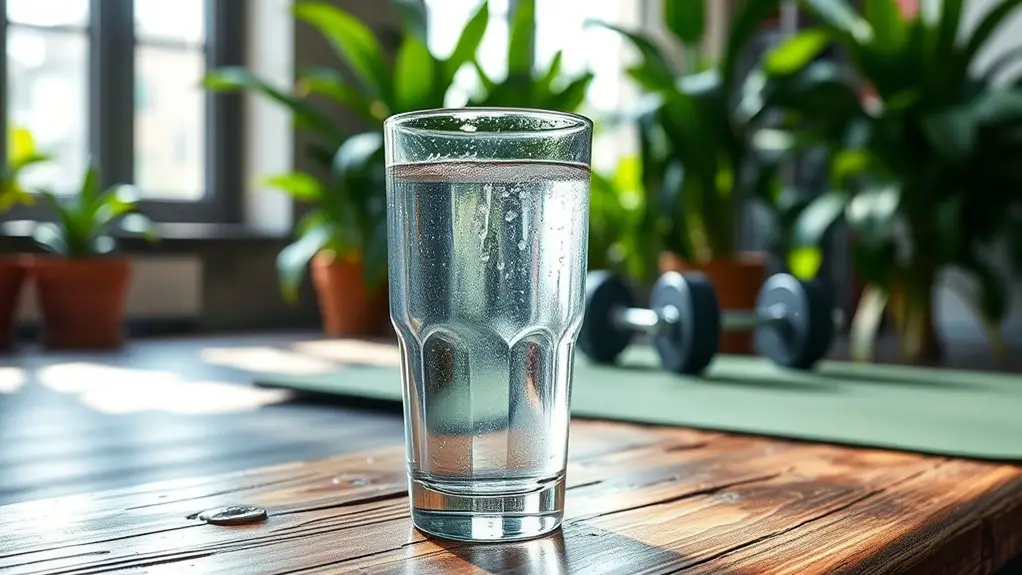How to Optimize Hormone Levels Naturally for Better Gym Gains

To optimize your hormone levels naturally for better gym gains, focus on balanced nutrition, quality sleep, and effective exercise. Prioritize protein and healthy fats in your meals, guarantee you’re hydrating adequately, and consider adding foods like spinach and fatty fish to your diet. Strength training and high-intensity workouts can boost hormone production, while stress management techniques, like mindfulness, can help regulate cortisol levels. There’s more to uncover about specific strategies for enhancing your results.
Understanding Hormones and Their Role in Muscle Growth

When you hit the gym, your body’s hormone levels can greatly influence your muscle growth and recovery. Understanding different hormone types is important. Testosterone production plays a significant role in stimulating muscle fibers and promoting anabolic processes. It binds to hormone receptors, enhancing protein synthesis and muscle repair. On the flip side, cortisol can have detrimental effects, increasing during intense workouts and potentially hindering recovery if levels remain elevated.
Estrogen also has a substantial role; it influences muscle mass and fat distribution. Those with higher estrogen levels may experience different muscle growth patterns. Additionally, insulin sensitivity is key for nutrient uptake, as it helps your body effectively use glucose and amino acids for recovery and muscle building. The endocrine system orchestrates these hormones, working together to regulate growth factors that support muscle adaptation. Understanding these interactions can help you optimize your training outcomes.
The Impact of Nutrition on Hormonal Balance
Hormonal balance is deeply intertwined with your nutrition choices, impacting everything from muscle growth to recovery. Proper macronutrient ratios play an essential role; for instance, a balanced intake of proteins, fats, and carbohydrates can enhance testosterone and insulin sensitivity, which are critical for building muscle. Additionally, meal timing can considerably affect hormone levels. Eating strategically around your workouts can optimize your anabolic response.
| Macronutrient | Ideal Ratio | Timing Strategy |
|---|---|---|
| Protein | 25-30% | Post-workout recovery |
| Carbohydrates | 40-50% | Pre- and post-workout |
| Fats | 20-30% | Throughout the day |
The Importance of Quality Sleep for Hormone Optimization

Quality sleep is a cornerstone of hormone optimization that shouldn’t be overlooked. When you prioritize sleep, you’re not just resting; you’re actively supporting your body’s hormonal balance. Disrupted sleep cycles can lead to imbalances in hormones like cortisol and testosterone, which can hinder your gym gains.
To optimize your sleep environment for better hormone levels, consider the following:
- Keep it dark and cool: A dark room helps regulate melatonin production, promoting better sleep cycles.
- Limit screen time: Blue light from devices can interfere with your ability to fall asleep and stay asleep.
- Establish a routine: Going to bed and waking up at the same time daily helps stabilize your sleep cycles, enhancing your overall recovery.
Effective Exercise Strategies to Boost Hormone Levels
Optimizing your exercise routine can greatly enhance hormone levels, complementing the benefits of quality sleep. To achieve this, prioritize strength training, as it’s been shown to boost testosterone and growth hormone levels. Aim for compound movements like squats and deadlifts, which engage multiple muscle groups.
Incorporate high-intensity workouts into your regimen. Short bursts of high-intensity exercise can lead to significant increases in hormonal response, improving your overall gains.
Don’t overlook endurance exercises, which can also play a role. Moderate aerobic activity helps balance cortisol levels, contributing to hormonal health. Additionally, incorporating workouts like skipping rope can serve as an effective full-body workout, further enhancing your fitness results.
Lastly, consider functional fitness routines that mimic everyday movements. These workouts improve overall strength and stability, promoting a healthy hormonal environment. By combining these strategies, you’ll optimize your hormone levels, supporting your fitness goals effectively.
Stress Management Techniques to Support Hormonal Health

Managing stress effectively is essential for maintaining ideal hormone levels, which can greatly enhance your gym performance. Techniques like mindfulness meditation, regular exercise, and good sleep hygiene can notably reduce stress and support hormonal health. By incorporating these practices into your routine, you’re not only boosting your mental well-being but also setting yourself up for better gains.
Mindfulness Meditation Benefits
While you may not realize it, incorporating mindfulness meditation into your routine can considerably impact your hormonal health. By practicing mindfulness techniques, you can achieve effective stress reduction, which is vital for maintaining balanced hormone levels. Research shows that regular meditation reduces cortisol, the stress hormone, and enhances overall well-being.
Here are some benefits you can expect:
- Improved Mood: Regular practice can help reduce anxiety and improve emotional regulation.
- Enhanced Focus: Mindfulness meditation sharpens your concentration, making your workouts more effective.
- Better Sleep: A calm mind promotes restful sleep, essential for hormone production and recovery.
Integrating mindfulness meditation into your daily life can help you manage stress and support your fitness goals.
Exercise for Stress Relief
Incorporating regular exercise into your routine can greatly enhance your ability to manage stress and support hormonal health. Engaging in yoga practices helps cultivate mindfulness while promoting relaxation. Cardio routines, like running or cycling, release endorphins that can boost your mood. Strength training not only builds muscle but also helps regulate hormones. Don’t forget breathing exercises; they can considerably reduce anxiety levels. Outdoor activities, such as hiking, provide fresh air and natural scenery, further alleviating stress. Group classes offer social support, making workouts more enjoyable. To keep things interesting, embrace workout variety and challenge yourself with new physical activities. By integrating these elements, you’ll create a holistic approach to stress relief and hormonal balance.
Sleep Hygiene Practices
Getting adequate sleep is essential for maintaining hormonal balance and overall health, as poor sleep hygiene can lead to elevated stress levels and disrupted hormone production. To optimize your sleep, focus on creating a conducive sleep environment and establishing a consistent bedtime routine.
- Limit screen time: Reduce exposure to blue light at least an hour before bed.
- Keep it cool and dark: Aim for a room temperature between 60-67°F and use blackout curtains.
- Practice relaxation techniques: Incorporate deep breathing or meditation to unwind before sleep.
The Role of Hydration in Hormonal Regulation

Staying properly hydrated is essential for maintaining ideal hormone levels, as water intake directly influences your body’s ability to regulate essential functions. When you’re dehydrated, electrolyte imbalances can occur, which may disrupt hormonal signaling and affect your gym performance. Prioritizing hydration can enhance your gains by supporting both physical and hormonal health.
Importance of Water Intake
Hydration plays an essential role in regulating hormone levels, which can greatly impact your gym performance and overall fitness goals. Maintaining proper water intake isn’t just about quenching thirst; it’s vital for optimizing hormone function. Here are some hydration strategies to take into account:
- Prioritize water quality: Filtered or mineral water can enhance absorption and provide essential minerals.
- Set hydration goals: Aim for at least half your body weight in ounces daily, adjusting based on activity level.
- Monitor your urine color: A light yellow indicates proper hydration, while darker shades signal a need for more water.
Electrolyte Balance Effects
While maintaining proper hydration is essential for gym performance, balancing electrolytes is equally important for hormonal regulation. An electrolyte deficiency can lead to fatigue, muscle cramps, and impaired recovery, all of which can hinder your gym gains. To optimize your hormone levels, focus on incorporating rich electrolyte sources into your diet.
| Electrolyte | Sources |
|---|---|
| Sodium | Sea salt, pickles |
| Potassium | Bananas, sweet potatoes |
| Magnesium | Spinach, nuts |
| Calcium | Dairy, leafy greens |
| Chloride | Seaweed, tomatoes |
Natural Supplements and Foods to Enhance Hormone Function
To optimize hormone function for better gym gains, incorporating specific natural supplements and foods into your diet can make a significant difference. Certain herbal remedies and essential nutrients are known to support hormone levels effectively. Here are some key options to reflect upon:
- Ashwagandha: This adaptogenic herb can help lower cortisol levels, promoting a balanced hormonal environment.
- Zinc-rich foods: Foods like oysters, pumpkin seeds, and spinach can enhance testosterone production, vital for muscle growth.
- Omega-3 fatty acids: Found in fatty fish like salmon and flaxseeds, these fats can help reduce inflammation and improve hormone signaling.
Frequently Asked Questions
Can Certain Foods Disrupt Hormone Levels Despite Being Healthy?
Absolutely, certain foods can disrupt your hormone levels, even if they seem healthy. For instance, someone with a sensitivity to gluten might experience hormonal imbalances, leading to fatigue and mood swings. It’s essential to pay attention to your body’s reactions and consider nutrient timing—eating the right foods at ideal times can help maintain balance. Always listen to your body, as food sensitivities can greatly impact hormone regulation and overall health.
How Does Age Affect Hormone Levels and Gym Performance?
As you age, you’ll notice significant age-related changes in hormone production, particularly testosterone and growth hormone. These declines can impact your gym performance, leading to reduced muscle mass, strength, and recovery time. It’s essential to adapt your training and nutrition as you get older, focusing on resistance training and nutrient-dense foods to help counteract these changes. Staying active and maintaining a healthy lifestyle can support your hormone levels and overall fitness.
What Are Common Signs of Hormonal Imbalance During Workouts?
When it comes to workout challenges, spotting hormonal symptoms is essential. You might notice fatigue that feels like you’re running on empty, mood swings that throw you off your game, or even unexpected weight changes. These signs can signal an imbalance in your hormones, impacting your performance. If you’re struggling to recover or feeling unusually hungry, it’s time to pay attention. Remember, your body’s trying to tell you something important.
Can Hormonal Fluctuations Impact Mood and Motivation for Exercise?
Yes, hormonal fluctuations can definitely impact your mood and motivation for exercise. When hormones fluctuate, you might experience mood swings or motivation dips, making it harder to stay committed to your workout routine. Research shows that imbalances can lead to increased fatigue and irritability, which can affect your performance. Staying aware of these changes can help you adapt your training and recovery strategies, ensuring you maintain a consistent and effective workout regimen.
Are There Specific Exercises That Negatively Affect Hormone Levels?
Yes, certain exercises can negatively affect hormone levels. High exercise intensity and excessive training frequency, particularly in endurance sports, may lead to elevated cortisol levels, which can impact your overall hormone balance. When you’re pushing yourself too hard without adequate recovery, it can suppress testosterone and other anabolic hormones. To maintain ideal hormone levels, make sure you incorporate rest days and a balanced training regimen that includes both intensity and frequency moderation.





